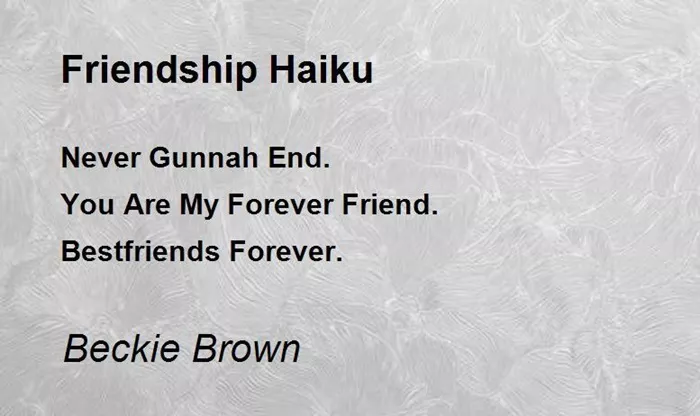Haiku is a traditional form of Japanese poetry that captures the essence of fleeting moments and profound emotions in just three lines. Its simplicity belies its depth, making it an ideal medium to express themes as universal and enduring as friendship. Friendship, like a haiku, is simple in its core but deep in its meaning. It grows from shared moments, mutual understanding, and silent bonds. This article explores the connection between haiku and friendship, presenting 8 carefully selected haiku that celebrate this special relationship. Alongside each poem, we’ll explore its meaning, the cultural backdrop, and the way haiku distills the beauty of friendship into concise yet evocative words.
1. Matsuo Basho: A Walk Together
“Under cherry trees,
friends’ laughter mingles with spring,
petals on the breeze.”
Matsuo Basho, one of the most celebrated haiku poets, often wrote about moments of companionship set against the backdrop of nature. This haiku evokes a scene of friends gathering beneath cherry blossoms, their laughter intertwining with the gentle spring breeze. It reminds us of how shared moments of joy become cherished memories.
The image of cherry blossoms symbolizes fleeting beauty, paralleling the transient nature of life and the preciousness of friendship.
2. Kobayashi Issa: The Kindness of Friendship
“Lonely firefly
joins a dancing stream of light—
companions at last.”
Kobayashi Issa often captured themes of loneliness and companionship in his haiku. Here, the firefly, initially alone, finds companionship among others. This poem speaks to the comfort and acceptance found in friendship. It illustrates that even in our solitude, the right connection can bring us into the light.
The fireflies’ gathering can be seen as a metaphor for how friends illuminate our lives, banishing darkness.
3. Yosa Buson: A Friend’s Presence
“Soft rain on the pond,
silent ripples spread outward—
a friend’s gentle touch.”
Yosa Buson, known for his visual and painterly haiku, captures the quiet reassurance of a friend’s presence. The rain and ripples on a pond symbolize the subtle yet profound influence a friend can have on our lives. This haiku is a testament to how friendship doesn’t always require words; sometimes, just being there is enough.
4. Chiyo-ni: Shared Strength
“Wisteria vines cling,
each branch lending strength to grow,
bound by silent trust.”
Chiyo-ni, one of Japan’s few notable female haiku poets, beautifully reflects the interconnectedness of friendship in this poem. The wisteria vines represent friends who support one another, growing stronger together. It emphasizes the symbiotic nature of friendships, where strength is both given and received.
This haiku resonates with those who have relied on friends in difficult times, finding strength in unity.
5. Taneda Santoka: Companions on a Journey
“Mountain path ahead,
two shadows merge into one,
friends walk side by side.”
Taneda Santoka often wrote about journeys, both physical and spiritual. This haiku highlights the camaraderie of walking through life’s challenges with a friend by your side. The merging shadows symbolize unity, underscoring how friends can lighten burdens simply by being present.
6. Haiku by Basho: Saying Goodbye
“Parting ways again—
tears fall like summer showers,
a rainbow remains.”
This haiku poignantly captures the bittersweet nature of parting from a dear friend. The tears and summer showers are transient, much like goodbyes. The rainbow that remains is a metaphor for the enduring memories and warmth left behind.
Basho reminds us that true friendships leave an indelible mark, even when distance separates.
7. Takahama Kyoshi: A Celebration of Togetherness
“Lantern light sways soft,
friends’ songs echo by the shore—
moon smiles down on us.”
Takahama Kyoshi, a prominent figure in modern haiku, brings to life a serene scene of friendship. The swaying lanterns and shared songs represent the warmth and harmony found in togetherness, while the moon’s gentle smile symbolizes the quiet joy that friends bring to our lives.
This haiku reflects the shared celebrations and peaceful unity of friendship, reminding us of the enduring light and joy that comes from spending cherished moments with those close to our hearts.
8. Issa: A Friend in Need
“Winter wind howls loud,
a warm hand finds mine through cold—
friendship’s quiet fire.”
This haiku encapsulates the comfort and warmth of a true friend’s support during challenging times. The cold winter wind contrasts sharply with the warmth of a friend’s hand, highlighting how friendship can bring solace even in the harshest moments.
The Timeless Connection Between Haiku and Friendship
Haiku, like friendship, endures across time and cultures. Both rely on simplicity and authenticity. A haiku captures a moment, just as friendships are often defined by shared experiences that seem small but hold immense meaning.
In Japanese culture, relationships are often tied to the concept of kizuna (bond) and omoi (feelings). These values align seamlessly with the themes of haiku, where brevity and depth coexist. The haiku presented in this article reflect the universal truths of friendship: its joy, strength, and lasting impact.
Conclusion
The simplicity of haiku reflects the essence of friendship—both are rooted in the profound, often understated beauty of life. By exploring these eight haiku, we gain insight into how poetry and friendship complement one another, offering lessons on appreciating, nurturing, and cherishing the connections we share.
Let these poems inspire you to treasure your friends, celebrate shared joys, and offer quiet strength during challenging times. In doing so, you’ll create memories as lasting and beautiful as the words of these timeless haiku.

